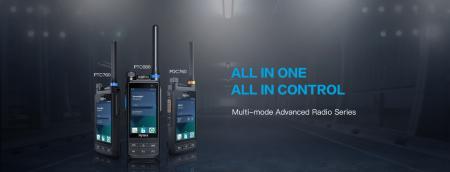The PMR industry has undergone tremendous changes in recent years. As the advent of broadband technology offers fast data services such as video calling and streaming, the expectation is that a majority of mission and business critical narrowband PMR users will migrate to broadband, yet many of them want to retain private narrowband systems for highly reliable voice services, which leads to a coexistence of the two technologies. Instead of launching ‘smart’ devices supporting largely separate broadband and narrowband radio modules, Hytera has introduced truly intelligent multi-mode advanced radios where the two technologies are deeply integrated at all levels to provide mission-critical voice and broadband data on the same device for the first time.
“Deep convergence is achieved at the physical hardware layer, protocol layer, and application layer to deliver a unified communication experience and a richer converged experience to users,” explains Zheng Xiaohua, the head of Hytera Pro. Terminal Product Line. “The broadband and narrowband platforms complement each other through their particular capabilities to provide customers with even greater value.”
Multi-mode radio pioneer
Zheng points out that the sophistication of the multi-mode advanced radio poses more stringent requirements on the R&D, product delivery, and service capabilities of radio manufacturers. Therefore, not all manufacturers are able to deliver new products to meet new industry trends. Hytera has pioneered broadband-narrowband convergence solutions and multi-mode advanced devices based on market research and demand forecasts.
As early as in 2014, when PMR communication vendors were still exploring the transformation from narrowband to broadband, Hytera began to study a broadband-narrowband converged solution and how to develop converged products.
Hytera launched its innovative PMR-LTE Convergence Solution and the first multi-mode advanced radio PDC760/PTC760 series in 2017. This was followed by the release of its latest multi-mode advanced radio, the PTC680 TETRA/LTE device, in June 2019.
The PTC680 embodies the concept of broadband-narrowband convergence, public and private network collaboration, and multi-purpose design, as it provides mission-critical voice communications and rich multimedia broadband data services on one device.
The new multi-mode advanced radio is proving popular. “At present, the PTC680 is in the market promotion and expansion stage, and it has been well received,” reports Zheng.
She adds that in China, pilot projects for the PTC680 have been established or are underway in 19 cities. In overseas markets, including Europe, Asia, and Africa, the target user base is very receptive to new products, and many business partners have shown interest in working with Hytera.
More functionality, more value
As mission-critical communications begin to migrate from narrowband to broadband networks, it is clear that traditional two-way radios can no longer meet the demands of high-end users seeking to take advantage of broadband data applications. As a result, Zheng believes that it is only a matter of time before multi-mode advanced radios replace traditional narrowband radios for mid- and high-end customers.
The main reason for this is the data. The data transmission rate of TETRA radios is only about 28.8 kbit/s. But multi-mode advanced radios with supporting broadband platforms can deliver up to 100Mbit/s high-speed and high-bandwidth broadband capabilities to mission-critical communications users such as police and fire services.
The broadband requirements of industry verticals vary, according to Zheng. “Some users are interested in PoC services, but these are subject to restrictions in terms of capabilities and service level guarantees. A different series of multi-mode advanced radios is required to meet the needs of end-users operating in various scenarios and to protect their original investment in PMR networks. Hytera provides a variety of multi-mode advanced radios and more reliable and comprehensive solutions to meet the specific use case scenarios of different industries,” she says.
Hytera has built up years of in-depth understanding of mission and business critical communications users across many industries and use cases. For example, multi-mode advanced radios can be used across Public safety, Airport, Energy industries in conjunction with industry-specific solutions such as Police App, Airport App and Patrol App.
Multi-mode advanced radios are very sophisticated devices, so are they affordable for traditional two-way radio users? “For those users, the price of a more powerful Hytera multi-mode advanced radio is only 5-10% higher than a traditional high-end narrowband radio produced by a counterpart. When the technology platform becomes mature, the multi-mode advanced radio will deliver higher value to users at a lower cost,” says Zheng.
Future innovations
Looking ahead, Zheng predicts that in the future multi-mode advanced radios will be able to take advantage of innovations in four key areas: 5G for ultra-reliable, low latency communications including fast processing of Big Data and video at the edge of the network; Artificial Intelligence using new smart chip platforms and algorithms, such as AI Engine or NPU; ‘smart soldier’ solutions to deliver intelligent personal networks and accessories to frontline staff; and smart personnel management through identification technologies such as voiceprint, facial and fingerprint recognition.
Hytera has established a first-mover advantage in the development of multi-mode advanced radios and narrowband-broadband converged solutions. As more manufacturers become interested in multi-mode advanced radios, market competition will definitely intensify.
Hytera believes that accurate insights into market and customer demands, high R&D investment, and continuous innovation and open ecosystems will be the only effective ways to maintain rapid growth and develop the radio industry into a smart one.




